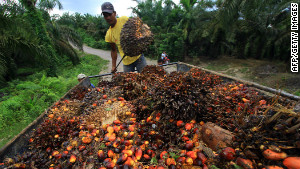A worker loads palm oil seeds into a cart in East Aceh, Indonesia.
Even if you've never visited Malaysia or Indonesia, it's likely that you've made contact with these countries through the chocolate bar you've just eaten or the soap you've just washed your hands with.
Over 87% of palm oil, a common ingredient in thousands of consumer commodities, was produced by the two countries in the past year, according to the United States Department of Agriculture (USDA).
Palm oil remains solid at room temperature, making it a remarkably versatile commodity used in cooking and processed food products like ice cream and cookies, as well as biofuels, agro-chemicals, and consumer products such as soaps, detergents, and cosmetics.
As a result, demand for palm oil has been steadily rising since the 1970s, making it hugely valuable ? and profitable.
Last week, Malaysian state-owned palm oil conglomerate Felda Global Ventures Holdings debuted on the Bursa Malaysia stock exchange in the world's second largest Initial Public Offering (IPO) this year. The share price of the world's third largest palm oil operator rose by 20%, generating US$3.2 billion for the company.
While the IPO has been a boon for the company's coffers, conservationists say the palm oil industry has been a curse for the environment in Malaysia and Indonesia.
Palm oil production threatens tropical forests, peatlands, and wildlife habitats, environmental groups such as Greenpeace say.
More than 10% of deforestation in Malaysia and Indonesia over the last 20 years occurred to make way for palm oil plantations, according to a report by the Union of Concerned Scientists (UCS). In Indonesia, an average of 300,000 hectares is lost annually to palm oil clearing, the report said.
One of the major consequences of deforestation is the effect on climate change. "Because forested land, especially forested peatland, has a high carbon density, the production of palm oil on deforested lands causes disproportionately greater...global warming emissions than an equal area of non-forested land," according to the UCS report.
The group estimates that growing and refining each metric ton of crude palm oil produces the equivalent of 0.86 metric ton of carbon dioxide or 860 kilograms.
http://articles.cnn.com/2012-07-06/asia/world_asia_palm-oil-industry_1_oil-forests-palm?_s=PM:ASIA

Tidak ada komentar:
Posting Komentar